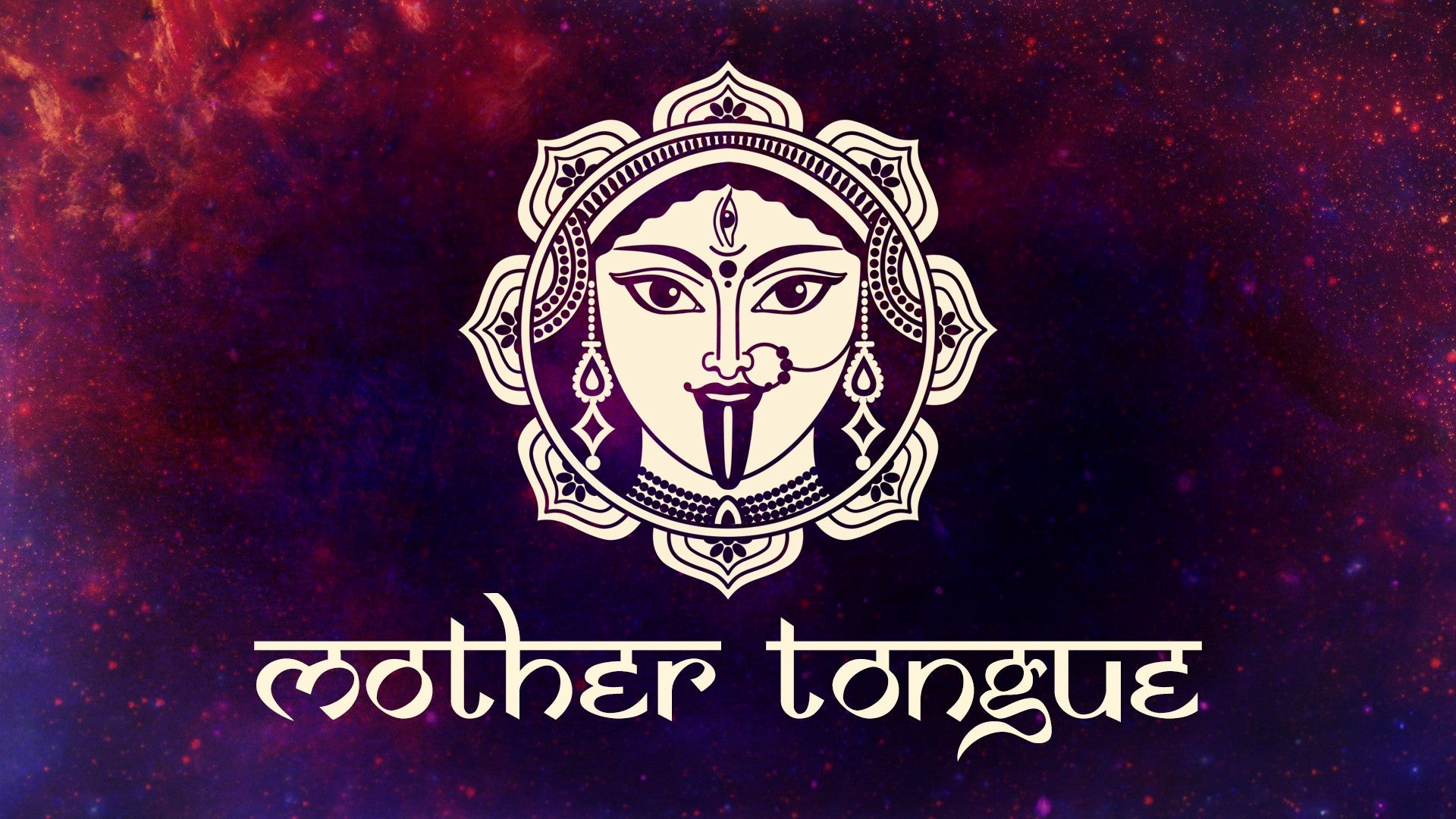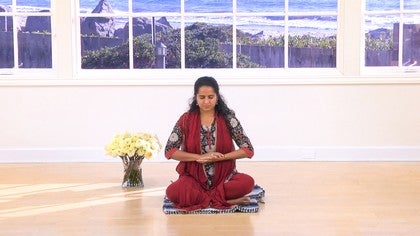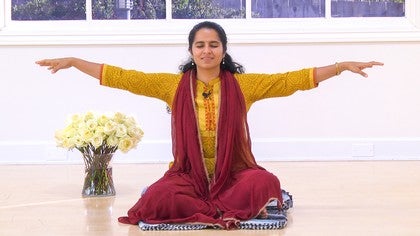Description
About This Video
Transcript
Read Full Transcript
Namaste, yogi friends. Welcome back to another season of Mother Town with our dear friend and teacher, Anuradha. In this season, we're exploring the play of mantra. And so, did I say that right? Perfectly.
And so, actually, why don't we just start there? Just the pronunciation of the word mantra. Generally, around here, we tend to find ourselves simply saying mantra. Can you help us understand the more precise pronunciation and why it's important? The word mantra is composed of these sounds.
You have the m, n, the, and r. The dental t is a unique sound of the Sanskrit language, which you also find in the French, Spanish, other languages. It does not exist in the English language, because in the English, you have a harder t sound alone. So this one is the soft dental t. So it's mantra.
There's a certain rhythm to it if you say it that way, you know? It's not just mantra. It's mantra. Mantra, perfect. And tell us a little bit more, please, about the practice and why one might engage in the practice of mantra.
What are some of the benefits? What are some of the results? And why are you using it as such a key teaching tool for learning the language of Sanskrit? The role of the mantra is very important because of the fundamental understanding that underlying everything in creation, there is an energy. And that energy is not just a static energy.
It is a vibrating energy. And therefore, underlying everything in the universe, there are vibrations. Mantra is the yoga or the art of using sound in a manner that will create its own very specific effect within the individual as well as in the world outside. So the word mantra is defined as mananat triyate iti mandra. Mananam comes from the word man.
Man means the mind, manas. Triyate, that which protects, comes from the root triy to protect. So mantra is that which protects the mind, is one way of looking at it, or the other way is like if you say by constant contemplation on this, on these sounds, one is protected. So how that happens is they say that like you do asanas for the body and pranayama is to train the breath, the use of sounds can be a very effective tool of training the mind. So if one goes back to the understanding of the universe in terms of vibrations, everything can be understood as a variation of different vibrations.
So the mind, the thoughts are nothing but vibrations. The emotions are a different kind or a different density of vibrations. The physical body itself has a different density of vibrations. So an individual is the sum total of all these vibrations put together. Now in this collection of vibrations, when you introduce a powerful vibration like a mantra, it can start changing the very sound structure of that individual and also harmonizing it with greater cosmic or universal vibratory patterns.
And that's why the practice of the mantra helps to channelize the energy, channelize in fact all the energies of the being in very specific manners which are in tune with a larger more truer vibratory pattern of the universe. And since you asked me why do I use it effectively to teach Sanskrit, I think that people normally have a certain apprehension about the reputation that Sanskrit has, has a very complex and very difficult language. But the whole beauty of Sanskrit is its, I would say the mantric quality. Because all the words in Sanskrit can be derived from root sounds. And those root sounds are conscious of the experience, the psychological experience of those sounds.
Is that clear? And therefore when you make a particular sound, you are actually creating the experiential value of that sound in yourself as well as in the environment around. In most languages when you use a certain sound for a certain word, there is no direct relationship with the experience of that word. Like if I give you the example of peace. So the word peace can mean to feel quiet and peaceful.
But you also use the word peace for a piece of cake. So you have the same sounds but the meaning is completely different and might not have anything to the whole experience of feeling that peace. But Sanskrit words mostly originate from root sounds that are inherently conscious of their experiential value. And therefore Sanskrit is not just another language of communication. While it does that very effectively, Sanskrit also becomes a language of creation itself.
And I think when people chant mantras, they begin to start experiencing the very power that sounds have on their entire being. And that I think is transformative. And that then makes them interested to know more about Sanskrit. Now tell us a little bit because here, especially in America, we like to play with things and make them our own. And if anything can turn into rock and roll, we'll do it.
So our temptation here and our fun to change the tunes of some of these mantras, to mix them with other things, to essentially allow the mantras to mix into the melting pot that we are here in America. Talk to us a little bit about what that might change in the juice of the mantra or can we still receive the benefits or is this, do we lose some of the preciseness or are we allowed to have fun? That's a little more tricky question, but I think it's a very significant one because in the Sanskrit tradition or in the Vedic tradition, there is a lot of emphasis that is placed on the correctness, not just of the pronunciation, but also of the intonation. And they say that a change of intonation can result in a complete change of meaning and effect, sometimes even reverse it. So coming from that tradition, one knows the value of the correctness of what has been laid down there.
Now having said that, we do find variations within the tradition as well. So I would be more open to accept the fact that there is a scope for slight modifications. And when I think the whole value of the mantra tradition or the deeper understanding of the mantra tradition is that there is a certain order in the universe. And when you use a particular rhythm, when you use a particular sound and you combine them, then you can get a maximum amplification of the desired vibration. And that normally the experience behind the mantra or the purpose of the mantra is to help an individual align with a deeper, calmer existence within oneself or a deeper and calmer truth within oneself.
And I think that's the net purpose or the net value of any mantra. Now what I would say is that every mantra or every song or sound also has the concept of tune in it. So music is another dimension of anything, of sounds that we produce. Music has its own play on the human system. It plays differently with your emotions, with your mind, and all of that.
So I think the way they do it in the West very often is that you would bring in music that would help to open up the heart. And that has its own value. I would say that I would really invite individuals to experience it for themselves and see what is the nature of the vibrations that is being produced. So it depends on what one wants to experience eventually. So if what one wants to experience is something which is calming, more deepening, and more centering, then I would think probably a tune that would suit or which would deliver that experience is a valuable one.
Whereas if what one wants is just the openness of the heart and a sense of an energy, then there is a different set of notes and tunes that would fulfill the purpose. But in the Indian tradition, we would tend to find more of the, I would say, the value of the original things. There is a sense of spontaneous respect of the natural order of things in that. So if that is how it has been said, the concept of the tradition, the authenticity of tradition is a very strong idea in India. So we do have Indian musicians also who change the tunes to the different ragas.
So I think there is a degree of flexibility that is possible to render these mantras. And at the end of it, I think what would attract the individual to a particular tune of the mantra would be to see how that particular tune impacts the different levels of their being. Help us understand why certain mantras are considered to be more sacred than others. For example, we're often told that the Gayathri is considered very, very special. Is this true?
Are we just getting rumors? Not with the Gayathri. The Gayathri mantra is known as the mantra raja or the king of all mantras. And it's from the Rig Veda by the sage Vishwa Mitra, the friend of the universe. That's what the name of the sage literally translates into.
And it is the oldest surviving mantra that has been that is being chanted every day by millions of people. So the very fact of people repeating a particular sound gives a lot of value to that sound in the universe. And therefore, I think of the mantras that have been charged with human aspiration, the Gayathri mantra would stand out as one of the foremost of such mantras. And in India, when people are initiated into the whole practice of learning of knowledge acquisition, they would initiate them using the Gayathri mantra. So the Gayathri mantra definitely has a very, very important position or an important place of respect of all the other mantras that we have.
And I think the reason for that is also because the Gayathri is the invocation of the sun to illumine our mind. And as human beings, the highest faculty we have is our mental faculty, which is often obscured in darkness of ignorance, etc. So the sun in this context is symbolic of the truth. So it is an invocation to that truth to illumine our minds. And once the mind is illumined with truth, whatever that one does would be in alignment with a greater cosmic order.
So it also recognizing that it's not just for me, but it's for everybody because it says, naf prachodayat, our enlightened our mind. So it's not just an individual, it's also a collective invocation for truth to reign supreme in the functioning of our daily lives. And I think that's very powerful. But we have a few others like the Mahamrithyunjaya, the invocation to the conqueror of death, Mahamrithyunjaya, and which has been very effectively used as well. So I think it has to do with the fact that there are some mantras that have probably a greater value in people's lives, and probably those are the ones that become more popular than others.
And because they're very powerful stuff, so some mantras are purposely kept a bit low because they could transform the universe with sound good and bad. So you have to be very careful what you're putting out there. So I'd like to just follow this thread just a little bit further because what I hear you saying is, in some ways what I hear you saying is certain mantras are just, they're well traveled paths, a lot of people have done them, they've proven themselves effective, so why not follow this effective path? Much like here in California, take the I-5. And so here in this country, particularly southern California, there's so much emphasis on the individual and finding our own unique path.
I can see somehow how maybe there's resistance to these more collective, well-traveled paths. Does that make sense? If one is willing to chant a more collective, well-used, well-recognized universal mantra, does that have the power to help transform one's understanding of not being a separate individual? I think the value of these mantras is not so much about the individuality or the collectivity, the way I hear it from what you're saying. I think it really has to do with what is the intention of the mantra itself.
So while choosing a mantra, I would probably fall back on that aspect of the mantra. But in terms of whether chanting a more collective mantra can help in recognizing the value of the collective, I think definitely it would play an important role because it would help the individual to start questioning the need for this individuality when there is a larger cosmic universal underlying oneness. So I think it can put into perspective this whole question of how unique should an individual get and how much commonness or oneness do we share. So while sharing that oneness, which the Gayatri mantra would allow us to do, or offering our unique sound into the common pool of aspiration, that is what it would do really in terms of participating in that. It does not take away from the individuality if one offers into a common pool.
And it would also support us better, I think, as individuals because of the basic understanding that we are not totally, it's like the ocean. So you can have a wave that arises, but it still is part of the wave. If the wave wanted to just hold itself through, it won't gather any momentum to move. So while recognizing that every wave has its unique height, its unique form, one must also recognize the fact that the wave is still part of the ocean and allowing that relaxation to happen. I don't know if that answered what you were saying.
Thank you, my dear friend. Thank you for being here. It's just an immense joy and privilege. Thank you, Kira, and it's always a great pleasure to share ideas with you and to Yoga Anytime for this opportunity. Thank you very much.
Dear friends, enjoy the mantras.
Mother Tongue: Mantra Practice
Comments
You need to be a subscriber to post a comment.
Please Log In or Create an Account to start your free trial.













 thank you
thank you 

